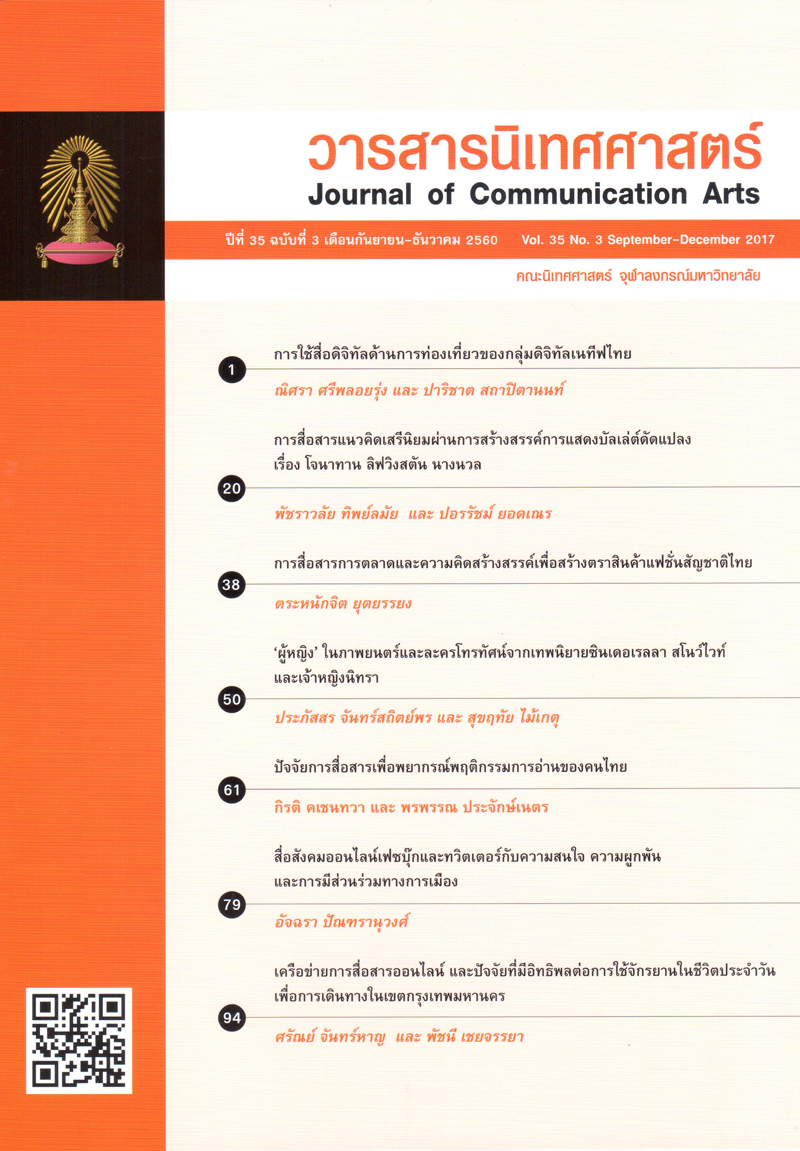การใช้สื่อดิจิทัลด้านการท่องเที่ยวของกลุ่มดิจิทัลเนทีฟไทย
Main Article Content
Abstract
This research aims to study (1) attitudes and digital media behavior of Thai digital natives toward tourism management; and (2) factors determining attitude and behaviors of Thai digital natives. A mixed method was applied as a tool--an E-survey quantitative research of 400 respondents for Structural Equation Modeling analysis, and a qualitative research with focus group and in-depth interview. Results are as follows: (1) Thai digital natives have positive attitude toward using digital media in tourism management and have same characteristic as global digital natives. (2) The majority of the respondents use digital media for travel planning prior their trip and during their trip. They use smartphone as a tool to access to information, then use Search Engine to gain travel information from global-media providers that provide service in Thai. They collect information on tourist attractions, photographs of touristic location, and tips from Thai online community platform. (3) Their attitude toward using digital media in tourism management is influenced by perceptions of usefulness, similarity and trustworthiness. (4) Their digital media behavior on tourism is influenced by perceived usefulness and attitude toward using digital media. (5) The other factors that determine their attitude and behaviors include travel inspirations, travel trends, promotions, the digital technology supporting, time and internet accessibility, and the travel experience in the past.
Article Details
References
?nid=7114
ชาตินพคุณ วิไลวรรณ. (2552). ความน่าเชื่อถือของข้อมูลข่าวสารในเว็บบอร์ดบลูพลาเน็ท พันทิปดอทคอม. วิทยานิพนธ์ปริญญามหาบัณฑิต สาขาวิชาวารสารสนเทศ จุฬาลงกรณ์มหาวิทยาลัย.
ฑิตยา ปิยภัณฑ์. (2556). ค่านิยมดิจิทัลกับพฤติกรรมด้านการสื่อสารออนไลน์ของเด็กและเยาวชนไทย. วิทยานิพนธ์ปริญญามหาบัณฑิต สาขาวิชานิเทศศาสตร์ จุฬาลงกรณ์มหาวิทยาลัย.
นภัสวัณจ์ ศักดิ์ชัชวาล. (2553). พฤติกรรมการแสวงหาข้อมูลการท่องเที่ยวผ่านสื่ออินเทอร์เน็ต เพื่อการตัดสินใจท่องเที่ยวภายในประเทศ. โครงการเฉพาะบุคคลปริญญามหาบัณฑิต สาขาวิชาการจัดการการสื่อสารองค์กร มหาวิทยาลัยธรรมศาสตร์.
พัชนีเชยจรรยา. (2558). ปัจจัยพยากรณ์การบอกต่อข่าวสารเพื่อส่งเสริมการท่องเที่ยวตลาดน้ำภาคกลางในสื่อสังคมออนไลน์ของนักท่องเที่ยว. วารสารนิเทศศาสตร์ธุรกิจบัณฑิตย์, 9(2 กรกฎาคม–ธันวาคม), 35-61.
มณีรัช รอดทรัพย์. (2552). เนื้อหาเกี่ยวกับการท่องเที่ยวและการตอบสนองของผู้รับสารในเว็บบอร์ด. วิทยานิพนธ์ปริญญามหาบัณฑิต สาขาวิชานิเทศศาสตรพัฒนาการ จุฬาลงกรณ์มหาวิทยาลัย.
ศุภกร จูฑะพล. (2557). ทัศนคติ พฤติกรรม และความคล่องดิจิทัลของกลุ่มดิจิทัลเนทีฟ. วิทยานิพนธ์ปริญญามหาบัณฑิต สาขาวิชานิเทศศาสตร์และนวัตกรรม สถาบันบัณฑิตพัฒนบริหารศาสตร์.
สุจิตรา ไชยจันทร์. (2553). พฤติกรรมการท่องเที่ยว การแสวงหาข่าวสารการท่องเที่ยว และทัศนคติที่มีต่อคุณลักษณะข่าวสารการท่องเที่ยวบนสื่อออนไลน์ ของผู้ใช้อินเทอร์เน็ตในประเทศไทย. โครงการเฉพาะบุคคลปริญญามหาบัณฑิต สาขาวิชาการบริหารสื่อสารมวลชน มหาวิทยาลัยธรรมศาสตร์.
อภิชาติ ติลกสกุลชัย. (2554). การศึกษาความต้องการข้อมูลของนักท่องเที่ยวชาวไทยผ่านสื่อออนไลน์ของการท่องเที่ยวแห่งประเทศไทย. วิทยานิพนธ์ปริญญามหาบัณฑิต สาขาวิชาวิทยาศาสตร์การกีฬา จุฬาลงกรณ์มหาวิทยาลัย.
Ajzen, I. (1985). From intentions to actions: A theory of planned behavior. In J. Kuhl & J. Beckmann (Eds.), Action Control: Cognition to behavior (pp. 11-39). Heidelberg: Springer.
Ayeh, J. K., Au, N., & Law, R. (2013). Predicting the intention to use consumer-generated media for travel planning. Tourism Management, 35(April 2013), 132–143.
Casaló, L. V., Flavián, C., & Guinalíu, M. (2010). Determinants of the intention to participate in firm-hosted online travel communities and effects on consumer behavioral intentions. Tourism Management, 31(6), 898-911.
Davis, F. D. (1986). A technology acceptance model for empirically testing new end-user information systems: theory and results. (Doctoral dissertation), Massachusetts Institute of Technology, Cambridge, MA.
Fogg, B. J., & Tseng, H. (1999, May). The elements of computer credibility. Paper presented at the SIGCHI Conference on Human Factors in Computing Systems, ACM, New York, NY.
Fotis, J., Buhalis, D., & Rossides, N. (2012). Social media use and impact during the holiday travel planning process. In M. Fuchs, F. Ricci & L. Cantoni (Eds.), Information and Communication Technologies in Tourism 2012. Vienna: Springer.
ITU. (2013). Measuring the information society 2013. Geneva Switzerland: International Telecommunication Union.
Minazzi, R. (2015). Social media marketing in tourism and hospitality. Switzerland: Springer International Publishing.
MindshareWorld. (2014, 13 June). มายด์แชร์ชี้สื่อสารกับดิจิตอลเนทีฟ (Digital Natives) ต้องง่ายและรวดเร็ว. Retrieved December 23, 2015, from http://www.mindshareworld.com
/thailand/news/mindshare-thailand-reveals-online-behavior-and-motivation-digital
-natives
Moon, J. W., & Kim, Y. G. (2001). Extending the TAM for a world-wide-web context. Information & Management, 38(4), 217–230.
Öz, M. (2015). Social media utilization of tourists for travel-related purposes. International Journal of Contemporary Hospitality Management, 27(5), 1003-1023.
Prensky, M. (2001). Digital natives, digital immigrants part 1. On the Horizon, 9(5), 1-6.
Solomon, M. R. (2015). Consumer behavior: Buying, having, and being (11th ed., Global ed.). Upper Saddle River, NJ: Prentice Hall.
Toffler, A. (1980). The Third Wave. New York, NY: Bantam Books.
Venkatesh, V. (2000). Determinants of perceived ease of use: Integrating control, intrinsic motivation, and emotion into the technology acceptance model. Information Systems Research, 11(4), 342-365.
Vivian, J. (2013). The media of mass communication (11th ed.). Upper Saddle River, NJ: Pearson Education.
Xiang, Z., & Gretzel, U. (2010). Role of social media in online travel information search. Tourism Management, 31(2), 179-188.
Zur, O., & Zur, A. (2011). On digital immigrants and digital natives: How the digital divide affects families, educational institutions, and the workplace. Retrieved January 9, 2016, from http://www.zurinstitute.com/digital_divide.html


